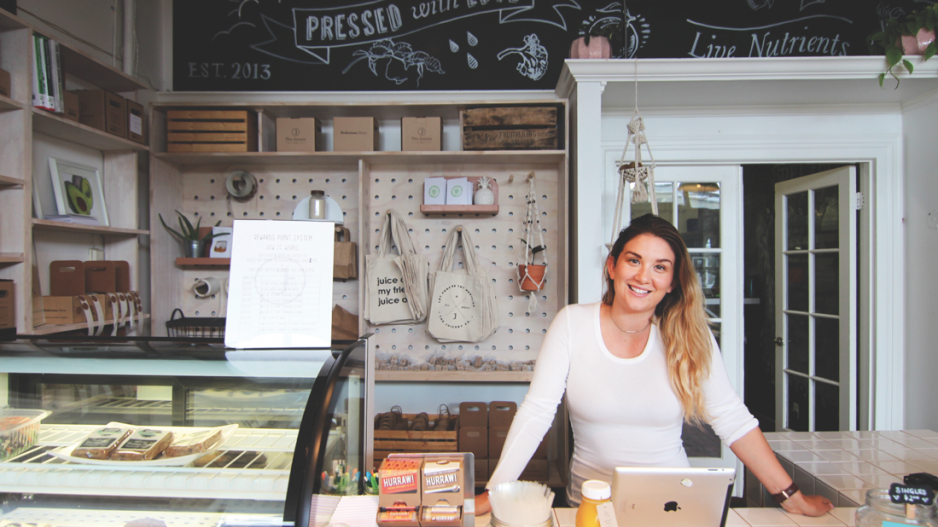Cold-pressed juice came in hard and fast as a health trend among the lifestyle elite. But now that the wave has slowed, making the business last is what Alex Troll, co-founder of the Juicery Co., has set her sights on.
Earlier this month, Troll, along with co-founder Christina Prevost – who is Troll’s mom – celebrated their third year in the juice business.
The company now has four stores – two in North Vancouver, one in Kitsilano and the newest addition on Main Street.
The Juicery employs roughly 50 people and is headquartered at the company’s 1,300-square-foot Lonsdale production facility in North Vancouver.
The other North Vancouver location is in Edgemont Village and, according to Troll, is the company’s most profitable due to lower rent costs, a small footprint and higher traffic.
Six months ago, the company opened its largest store yet. Located at 4236 Main Street, the 1,600-square-foot retail store is what Troll envisions the future of her brand to look like.
“Main is our new concept of bigger, more in-store seating, retail,” Troll said. We are going to have a full café with espresso machine. It needs to be an experience; the space needs to provide something.”
Troll said she envies the business model of juice shops in Los Angeles, many of which are very small spaces with just a fridge and a salesperson.
“You can’t find spaces that small [in Vancouver]. There are no to-go windows because of the rain and there is not as much outdoor leisure space to utilize.”
The company’s new concept will incorporate coffee and retail and will expand on food offerings with their own meals and snacks. The Juicery already carries items from Culver City Salads and Vital Supply Co., two other small, local businesses in the health-food sector.
Troll is a born-and-raised Vancouverite. She attended Capilano University for business management and spent several years working for Artizia. There, she learned the most about retail, she said.
“First, I started selling all these juice cleanses to co-workers and friends. Then we started our website and we thought we would just do delivery and online and we wouldn’t bother with bricks and mortar.”
Cleanses are what initially drew customers to the company. A box of detox juices costs roughly $200.
Troll came up with the idea after her grandfather was diagnosed with esophageal cancer, which prevented him from eating, so the family began crafting health juices as a nutritional therapy.
The family now owns 51 acres of farming land in Pemberton, B.C., where they grow and produce their own organic vegetables. The initial vision of no retail has been reversed.
“Bottling and full production is a lot of effort so I had to decide [between] wholesale or retail, and I had worked retail for over six years,” she said. “Wholesale meant I would have to bring down my margin, which would mean I would have to go non-organic or plastic or poorer-quality juices, and I wasn’t willing to do that.”
The company engages in no formal marketing beyond social media and Facebook, yet its focus on retail has paid off, with customers dishing out $10 to $13 per bottle of juice. The company also offers a rewards program for bottles returned.
“You can authentically grow your social media by connecting with other business owners and supporting each other,” she said. “We found like-minded businesses to collaborate with and in turn we helped others launch their business or provide them space. We provide our space for a lot of different pop-ups or workshops and they bring us customers.”
The Juicery has partnered with other local companies like Harlow Skin Co. and Kitskitchen Health Foods to boost the health community in Vancouver and lean upon each other for support.
When asked about advice she would give entrepreneurs looking to start a business in this city, Troll stressed that knowing your weaknesses is a strength.
“A lot of small businesses don’t want to spend the money on human resources or pay people to do things you think you could do yourself, but the reality is there is always someone out there who can do it better. It is important to know what you are good at and hire the right people to do the things you aren’t good at.” •




